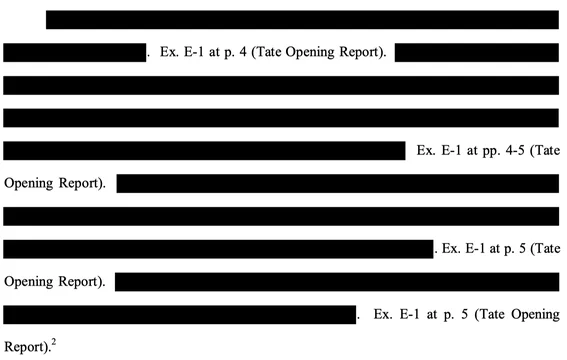
The parties in Progressive Sterilization, LLC v. Turbett Surgical LLC, C.A. No. 19-637 (D. Del.) brought a dispute about "excessive" redactions to certain production in their patent action.
The defendant sought information from third parties who were under contract with the plaintiff, including various consultants and a former business partner.
Plaintiff apparently has confidentiality agreements with these people, and tried to filter their document production in the case, redacting information it thought should not be produced to the defendant. According to defendant's letter brief:
[Plaintiff] insisted on reviewing [the] third-party subpoena recipients’ responsive documents and redacting certain non-privileged content . . . prior to their production to Defendants
According to the plaintiff, the material they redacted was either trade secrets or was unrelated to the case:
The information produced in response encompassed confidential information and trade secrets on product designs that are not in production or offered for sale, studies and test methods unrelated to any claim in the case, and opinions on regulatory requirements applicable.
Defendant objected that the fact that the protective order in the action provides an attorneys' eyes only (AEO) designation was sufficient to product the documents, and the redactions were unnecessary.
Plaintiff responded that the AEO designation wasn't enough:
The AEO designation alone is wholly inadequate to protect [plaintiffs'] interests due to the extreme prejudice to them should any disclosure of this information occur, whether inadvertent or not.
The Court didn't buy it. Judge Burke ordered production of the redacted material—even if it is irrelevant—because it is necessary to give context to the remainder of the documents:
With regard to Defendants' request that the Court order that [Plaintiffs] remove [their] redactions from certain third−party documents, . . . it is GRANTED. The Stipulated Confidentiality Order ("CO") in this case provides that certain highly sensitive documents may be designated "Attorneys' Eyes Only" ("AEO") and may not be disclosed to the parties in this case. . . . Plaintiffs have not demonstrated why these provisions of the CO (which the parties have invoked "liberally" in this case with regard to many produced documents), . . . are not sufficient to protect their confidential information without the need for further redaction. (See D.I. 184, ex. A at 2 (stating that counsel for one of the third parties noted to Plaintiffs that it did not see why redaction was needed in light of the CO's provision for an AEO production)) Furthermore, even if the redacted material is irrelevant to the case (it is not clear to the Court whether it is or is not), the material is found in documents that undisputedly are relevant to the case, and the redactions at issue "may deprive the reader of context."
The issue of redactions in document production is something that comes up with fair frequency in patent litigation, and it's nice to have another clarification from the Court as to when redactions are appropriate.
What if there is no protective order in the action?
The fight here centered around the fact that the parties' stipulated protective order includes an AEO designation. But, even absent a protective order, D. Del. local rule 26.2 provides some level of AEO protection to productions:
RULE 26.2. Confidentiality . . . If any documents are deemed confidential by the producing party and the parties have not stipulated to a confidentiality agreement, until such an agreement is in effect, disclosure shall be limited to members and employees of the firm of trial counsel who have entered an appearance and, where appropriate, have been admitted pro hac vice. Such persons are under an obligation to keep such documents confidential and to use them only for purposes of litigating the case.
I'm not saying that LR 26.2 is necessarily 100% as effective as a protective order. But I have to think that the same logic may apply—even if the parties have not entered into a protective order, a party could argue that LR 26.2 provides the same protections against disclosure, and redaction of trade secret information (even if irrelevant) from otherwise relevant documents is inappropriate.
If that's the case, then the only time it would arguably be appropriate to make such redactions would be in cases with a single-level protective order that provides no AEO protections, which is practically unheard of in patent litigation.
If you enjoyed this post, consider subscribing to receive free e-mail updates about new posts.






